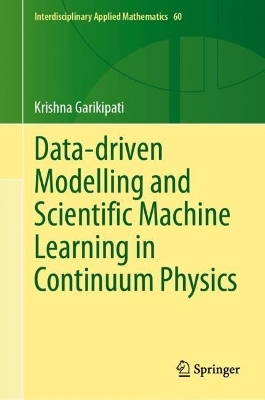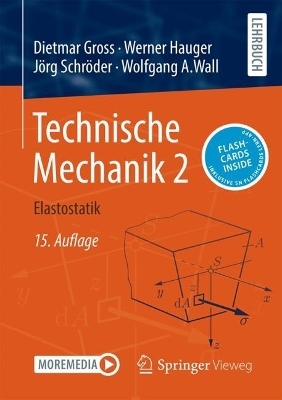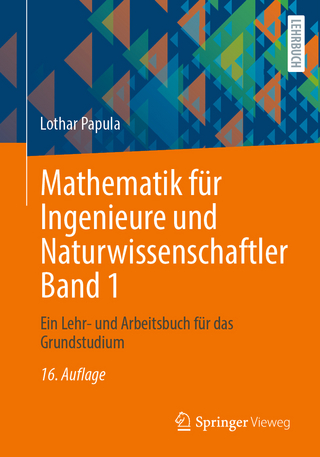
Data-driven Modelling and Scientific Machine Learning in Continuum Physics
Springer International Publishing (Verlag)
978-3-031-62028-7 (ISBN)
This monograph takes the reader through recent advances in data-driven methods and machine learning for problems in science-specifically in continuum physics. It develops the foundations and details a number of scientific machine learning approaches to enrich current computational models of continuum physics, or to use the data generated by these models to infer more information on these problems. The perspective presented here is drawn from recent research by the author and collaborators. Applications drawn from the physics of materials or from biophysics illustrate each topic. Some elements of the theoretical background in continuum physics that are essential to address these applications are developed first. These chapters focus on nonlinear elasticity and mass transport, with particular attention directed at descriptions of phase separation. This is followed by a brief treatment of the finite element method, since it is the most widely used approach to solve coupled partial differential equations in continuum physics.
With these foundations established, the treatment proceeds to a number of recent developments in data-driven methods and scientific machine learning in the context of the continuum physics of materials and biosystems. This part of the monograph begins by addressing numerical homogenization of microstructural response using feed-forward as well as convolutional neural networks. Next is surrogate optimization using multifidelity learning for problems of phase evolution. Graph theory bears many equivalences to partial differential equations in its properties of representation and avenues for analysis as well as reduced-order descriptions--all ideas that offer fruitful opportunities for exploration. Neural networks, by their capacity for representation of high-dimensional functions, are powerful for scale bridging in physics--an idea on which we present a particular perspective in the context of alloys.
One of the most compelling ideas in scientific machine learning is the identification of governing equations from dynamical data--another topic that we explore from the viewpoint of partial differential equations encoding mechanisms. This is followed by an examination of approaches to replace traditional, discretization-based solvers of partial differential equations with deterministic and probabilistic neural networks that generalize across boundary value problems. The monograph closes with a brief outlook on current emerging ideas in scientific machine learning.
Krishna Garikipati obtained his PhD at Stanford University in 1996, and after a few years of post-doctoral work, he joined the University of Michigan in 2000, rising to Professor in the Departments of Mechanical Engineering and Mathematics. Between 2016 and 2022, he served as the Director of the Michigan Institute for Computational Discovery & Engineering (MICDE). In January 2024 he moved to a a new position as Professor of Aerospace and Mechanical Engineering at University of Southern California. His research is in scientific machine learning and computational science, with applications drawn from biophysics, materials physics, mechanics and mathematical biology. He has been awarded the DOE Early Career Award for Scientists and Engineers, the Presidential Early Career Award for Scientists and Engineers (PECASE), and a Humboldt Research Fellowship. He is a fellow of the US Association for Computational Mechanics, and the International Association for Computational Mechanics, a Life Member of Clare Hall at University of Cambridge, and a visiting scholar in Computational Biology at the Flatiron Institute of the Simons Foundation.
Part I. Introduction and Background in Continuum Materials Physics.- Introduction.- Nonlinear Elasticity.- Phase Field Methods.- Part II. Solving Partial Differential Equations.- Finite Element Methods.- Part III. Data-driven Modelling and Scientific Machine Learning.- Reduced Order Models: Numerical Homogenization for the Elastic Response of Material Microstructures.- Surrogate Optimization.- Graph Theoretic Methods.- Scale Bridging.- Inverse Modeling and System Inference from Data.- Machine Learning Solvers of Partial Differential Equations.- An Outlook on Scientific Machine Learning in Continuum Physics.- References.
| Erscheinungsdatum | 31.07.2024 |
|---|---|
| Reihe/Serie | Interdisciplinary Applied Mathematics |
| Zusatzinfo | XIV, 230 p. 75 illus., 70 illus. in color. |
| Verlagsort | Cham |
| Sprache | englisch |
| Maße | 155 x 235 mm |
| Themenwelt | Mathematik / Informatik ► Mathematik ► Angewandte Mathematik |
| Mathematik / Informatik ► Mathematik ► Wahrscheinlichkeit / Kombinatorik | |
| Schlagworte | Computational Physics • Data Science • Inverse Problems • Neural networks • Scientific Machine Learning |
| ISBN-10 | 3-031-62028-3 / 3031620283 |
| ISBN-13 | 978-3-031-62028-7 / 9783031620287 |
| Zustand | Neuware |
| Informationen gemäß Produktsicherheitsverordnung (GPSR) | |
| Haben Sie eine Frage zum Produkt? |
aus dem Bereich


